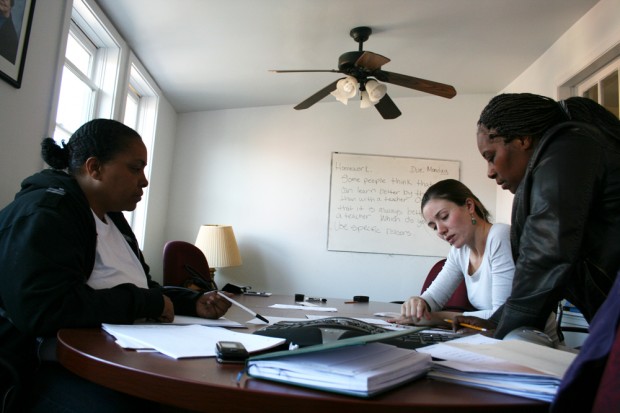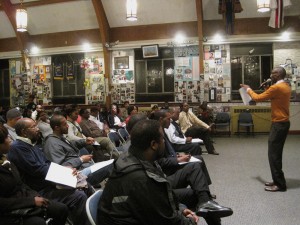Division of Labor: The Gap Between Skills and Jobs
While much of the country struggles with job creation, D.C. is in the unique position of having more jobs than residents. So why are some D.C. neighborhoods facing Depression-era unemployment rates? DCentric examines how D.C.’s healthy economy has left out so many Washingtonians and what some are doing to close the unemployment gap.

Elahe Izadi / DCentric
Melissa Moon, left, and Twana Deal, right, review math problems after their adult education class at Southeast Ministry with instructor Riley Grime, middle.
Melissa Moon, 42, used drugs as a high school sophomore and eventually dropped out. Twana Deal, 49, dropped out of high school after she got pregnant at age 17.
“If I knew then what I was going to go through, I would have gone to school pregnant,” Deal said. “But I was a teenager. I didn’t know better.”
Both women are now enrolled in adult education classes as they work toward earning GED degrees. On a recent afternoon, the two spent time after their class at Southeast Ministry, a nonprofit in their neighborhood, going over math word problems. Deal wants to open a child day care. Moon, who has a temporary part-time job, wants to become a medical assistant.

Image: Carrie Moskal / WAMU
"Division of Labor" is DCentric's examination of D.C.'s unemployment disparity.
“I don’t want to have [any] more problems. The medical field is growing and they need assistants,” Moon said.
In Ward 8, where Moon and Deal live, about half of adults over age 25 have finished high school but not college, and 21 percent haven’t finished high school, according to 2009 Census data. Ward 8 also has a 26 percent unemployment rate. On the other side of the Anacostia River, in Ward 3, unemployment is about 3 percent and more than half of residents have graduate or professional degrees.
Many of the available jobs in the District, the ones that attract people from around the country, require advanced degrees. This mismatch, or skills gap, means many of those born and raised within the District are increasingly being left out of its economic success.
Credentials Are In Demand
While other parts of the country have manufacturing and other industries to rely on, D.C.’s biggest industry is the federal government. Landing a federal job often requires high levels of education.
“D.C. is a service economy. We don’t have a boatload of entry-level jobs in the District,” D.C. Chamber of Commerce President Barbara Lang said.
Number of Jobs in D.C. By Industry (Source: D.C. Department of Employment Services)
According to D.C. labor statistics, 65 percent of job openings listed online in November required a minimum of a bachelor’s degree and less than 14 percent required a minimum of a high school diploma. The professionals that are most in demand are computer programmers, registered nurses and market analysts.
The Impact of City Policy
The District has approximately 700,000 jobs and about 600,000 residents. But non-District residents fill many jobs, from senior to entry-level positions. That means D.C. loses out on income and other taxes.
The city has a First Source law requiring developers who receive public money to hire D.C. residents to fill 51 percent of new jobs. But audits have shown that contractors seldom meet the standards and rarely are punished for it. The law needs to be revamped, said City Councilman Michael Brown (At-Large), chair of the council’s Housing and Workforce Development Committee.
The updated First Source law, which is scheduled for a final vote Tuesday, includes increased reporting provisions, fines for non-compliance and a workforce representative who will connect job training graduates with employers.
Brown said he hopes the changes will make a dent in unemployment. “But keep in mind, this revamped bill is not any kind of silver bullet,” he added. “There are several other pieces to job creation that have to occur.” Those include an improved economy and better training for new industries, he said.
There’s only so much city officials can do at the moment when it comes to private businesses not receiving any public money. Mayor Vincent Gray, for instance, launched the One City One Hire initiative to encourage businesses to hire at least one unemployed D.C. resident. By the end of November, 204 employers had signed up for the program and 502 people had been hired through it.
Still, more than 36,000 D.C residents remain unemployed, making the citywide unemployment rate 11 percent.
Could Walmart Help?
One solution, Lang said, is to bring more businesses into D.C. offering jobs that don’t require college degrees. Some of the chronically unemployed “aren’t going to be the next lobbyist or IT professional or accountant. We need to come to that realization,” Lang said.
Read More:
Explaining D.C.’s Unemployment Disparities
The Gap Between Skills and Jobs
Immigration and D.C. Unemployment
The promise of jobs is one reason why Walmart’s entry into the District is so appealing to lawmakers such as Councilwoman Yvette Alexander (Ward 7).
“A lot of people are criticizing retail establishments like Walmart coming in, but that’s exactly what we need in a place like Washington, D.C., to attract those kinds of businesses to get everyone employed,” Councilwoman Alexander said.
Unions and others are protesting the discount retailer opening in D.C., taking issue with the company’s checkered past in its treatment of workers, Walmart’s impact on small businesses and the possible low wages offered.
A Walmart job may not be enough to climb out of poverty, particularly in the District where the cost of living is rising.
Marina Streznewski of DC Jobs Council said the entry-level jobs that do exist in the District “don’t pay family-sustaining wages. They’re not designed to.”
Raising a New Crop of Professionals
Raymond Bell sees a different solution. He runs the H.O.P.E. Project, a program that trains residents mostly east of the Anacostia River to become IT professionals in a series of free courses.
“There are more than enough jobs,” he said. “But most of the people who are unemployed are low-skilled, and there’s only so many low-skilled jobs.”
A number of job training programs operate in the District. D.C. has an on-the-job training initiative, and many nonprofits offer training in everything from construction to working in the hospitality industry.
Bell small program runs on volunteers and he said he provides most of the funding. It’s had some successes. One of his graduates went from working in a liquor store to getting an IT job at the Navy Yard, making $42,000 a year. Bell believes schools aren’t teaching young people skills to be good communicators and act professionally in the workplace. He said he wants to address both problems.

Elahe Izadi / DCentric
More than 100 people assembled in Ward 8 to hear Raymond Bell, right, talk about his job training program.
Young people in D.C. “are competing against kids who may come here to go to school from Middle America. And those kids don’t go home anymore. They stay here because there aren’t jobs back in those parts of the country,” Bell said. “You have kids with a degree in English from George Washington [University] going against someone with a high school diploma from Ballou [Senior High School].”
Keyana Holley, 20, attended a recent information session on Bell’s program because “it sounded like a good opportunity.” The Ward 8 resident works as a hair stylist.
“What I do now is what I want to fall back on,” she said. “I feel like I want more.”
The H.O.P.E. Project may seem helpful for people like Holley, but it’s not an option for everyone. More than 100 people attended the information session. There were only four slots open.
Preparing Kids and Adults
Aside from basic reading and writing skills, there’s a very large digital divide in the District, where people living in low-income communities lack access to high-speed Internet. Many companies direct prospective hires to apply for jobs online. Community organizers say the out-of-work people they serve often need assistance with online job applications.

Elahe Izadi / DCentric
Students take notes during an adult education class at Southeast Ministry.
One way to combat the skills gap is to focus on training individuals when they’re young and ensuring their schools are wired. But many adults still need help, said Valarie Ashley of Southeast Ministry. About 20 percent of District adults are functionally illiterate, according to the National Center for Education Statistics.
“It’s almost like we want to forget them or brush them aside and act like we can start fresh with children,” she said. “The slice of the world I see is one where there’s a big problem with people lacking literacy skills and numeracy skills. We’re talking about people coming in with a fifth- or sixth-grade reading level. They’re not going to get a GED quickly or easily.”
Moon knows her path to becoming a medical assistant won’t be short and will require more schooling beyond earning a GED certificate. But her children are her motivation.
“I have two kids who look up to me and watch me. I just don’t want to be sitting at home while they’re at school,” Moon said. “I just keep coming here [to class] because it’s something I want. I want my GED.”
-
Anonymous
-
Brimstone
-
http://twitter.com/raybelljr raymond bell
-
Barbara




